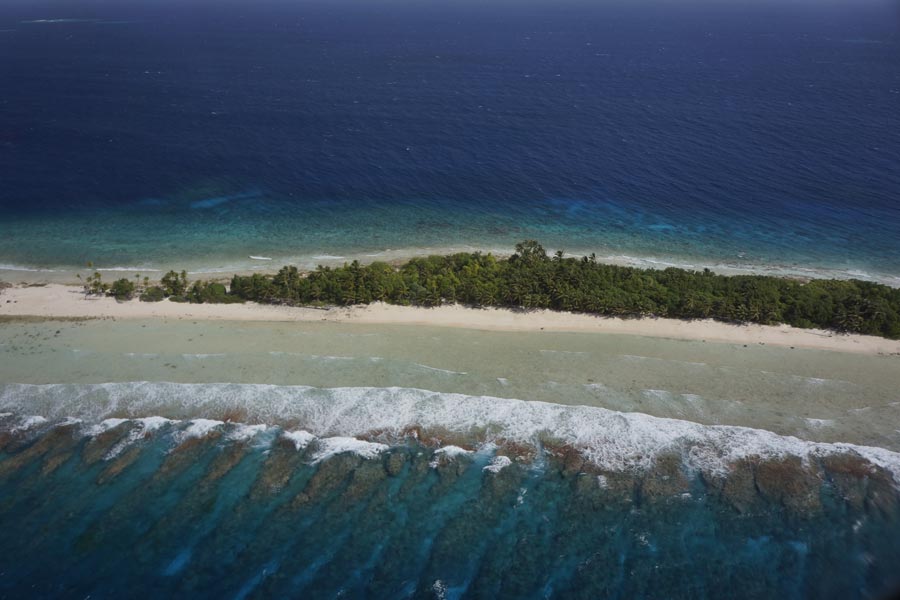

Aerial photograph of Kwajalein Atoll in the Marshall Islands showing its low-lying islands and coral reefs. A new study gives guidance to coastal managers to assess how climate change will affect a coral reef’s ability to mitigate coastal hazards.
Credit: Curt Storlazzi/USGS
About 30 million people are dependent on the protection by coral reefs as they live on low-lying coral islands and atolls. At present, some of these islands experience flooding due to wave events a few times per decade.
It is expected that this rate of flooding will increase due to sea level rise and coral reef decay, as the remaining dead corals are generally smoother in structure, and do less to dissipate wave energy. Loss of coral cover not only causes increased shoreline erosion but also affects the sparse drinking water resources on these islands, which may eventually make these islands uninhabitable.
In order to prevent or mitigate these impacts, coastal managers need know to what extent their reef system may lose its protective function so that they can take action. The new study by researchers from the Dutch independent institute for applied research Deltares and the U.S. Geological Survey gives guidance on a local reef’s sensitivity to change. The new research has been accepted for publication in Geophysical Research Letters, a journal of the American Geophysical Union.
To gain insight into effects of changing conditions on coral reefs, the study authors used Xbeach, an open-source wave model. The computer model was first validated using field measurements obtained on the Kwajalein Atoll in the Marshall Islands in the Pacific Ocean, and was then used to investigate what the effects on water levels, waves, and wave-driven runup would be if certain reef properties change. Reef roughness, steepness, width and the total water level on the reef platform are all important factors for coastal managers to consider when planning mitigating measures, according to the study’s authors.
The results suggest that coasts fronted by relatively narrow reefs with steep faces and deeper, smoother reef flats are expected to experience the highest wave runup and thus the greatest potential for island flooding.
Wave runup increases for higher waves, higher water levels that are expected with sea level rise, and lower bed roughness that occurs as coral degrades and becomes smoother. These are all expected effects of climate change. Rising sea levels and climate change will have a significant negative impact on the ability of coral reefs to mitigate the effects of coastal hazards in the future, according to the new study.
The American Geophysical Union is dedicated to advancing the Earth and space sciences for the benefit of humanity through its scholarly publications, conferences, and outreach programs. AGU is a not-for-profit, professional, scientific organization representing more than 60,000 members in 139 countries. Join the conversation on Facebook, Twitter, YouTube, and our other social media channels.
Deltares is an independent institute for applied research in the field of water and subsurface. Visit http://www.deltares.nl
USGS provides science for a changing world. Visit USGS.gov
Notes for Journalists
A PDF copy of the article is available by clicking on this link: http://onlinelibrary.wiley.com/doi/10.1002/2015GL064861/abstract?campaign=wlytk-41855.5282060185
Or, you may order a copy of the final paper by emailing your request to Nanci Bompey at nbompey@agu.org. Please provide your name, the name of your publication, and your phone number.
Neither the papers nor this press release is under embargo.
Title
“The influence of coral reefs and climate change on wave-driven flooding of tropical coastlines”
Authors:
Ellen Quataert: Department of Applied Morphodynamics, Deltares, Delft, Netherlands; and Faculty of Civil Engineering and Geosciences, Delft University of Technology, Delft, Netherlands;
Curt Storlazzi: Pacific Coastal and Marine Science Center, U.S. Geological Survey, Santa Cruz, California, USA;
Arnold van Rooijen: Department of Applied Morphodynamics, Deltares, Delft, Netherlands;
Olivia Cheriton: Pacific Coastal and Marine Science Center, U.S. Geological Survey, Santa Cruz, California, USA;
Ap van Dongeren: Department of Applied Morphodynamics, Deltares, Delft, Netherlands.
Contact Information for the Authors:
Curt Storlazzi: +1 (831) 295-3429, cstorlazzi@usgs.gov
Ap van Dongeren: +31(0)88335 8351, ap.vandongeren@deltares.nl
AGU Contact:
Nanci Bompey
+1 (202) 777-7524
nbompey@agu.org
USGS Contact:
Leslie Gordon
+1 (650) 329-4006
lgordon@usgs.gov
Deltares Contact:
Mariska van Gelderen
+31 (0)6 13 67 13 70
Mariska.vanGelderen@deltares.nl












